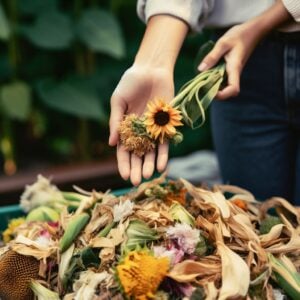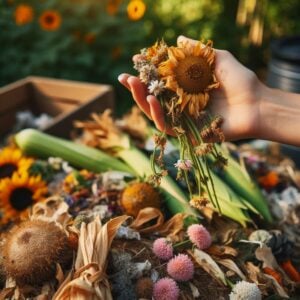Download: Can You Compost Flowers? An Essential Guide for Gardeners
Table of Contents
Have you ever wondered, “Can you compost flowers?” You’re not alone! As an avid gardener and compost enthusiast, I’m here to share my insights on this topic. Composting flowers is not only possible but also beneficial for your garden. However, it’s crucial to be mindful of certain types of flowers and their conditions before adding them to your compost pile.
Read: Learn more about composting
Understanding the Role of Flowers in Compost: Greens vs. Browns
Before diving into the specifics of composting flowers, it’s essential to understand the basics of green and brown materials in composting. Greens are moist, nitrogen-rich organic materials, while browns are dry and carbon-rich. Examples of greens include vegetable peels, fruit scraps, grass clippings, and yes, flowers. Browns, on the other hand, include items like sawdust, shredded newspaper, and dried plant matter.
Flowers can be categorized as either green or brown compostables. Fresh, moist flowers are considered greens, while dried flowers fall under the browns category.

Tip: Learn more about compostable materials
Step-by-Step Guide to Composting Flowers
Composting flowers is a straightforward process, but following best practices ensures effective decomposition. Here’s how you can compost flowers in bins, tumblers, heaps, or piles:
- Preparation: Chop the flowers into smaller pieces to increase their surface area, aiding faster decomposition.
- Sorting: Remove non-compostable parts like thorns or bulbs. While thorns can decompose, they may take longer and potentially affect the compost’s pH balance.
- Mixing: Combine fresh flowers with other greens like vegetable scraps or grass clippings. If composting dried flowers, mix them with browns like shredded cardboard or dry leaves.
- Layering: Add the flower mixture to your compost bin in layers, alternating between greens and browns.
- Moistening: Sprinkle water gently between layers to maintain moisture, which accelerates the composting process.
- Turning: Start turning the compost every couple of weeks to enhance microbial activity and decomposition.
Related: Adding Worms To Compost: The Detailed Guide
Decomposition Timeline for Flowers in Compost
The decomposition rate of flowers in compost varies. While most flowers decompose quickly, harder parts like thorns may take longer, especially in compost bins that don’t generate much heat. A well-managed compost bin can decompose flowers within six months to a year. However, without proper composting practices, it could take longer.
Related: Composting Limes (Fruits) And Lime ( CaCO3): The Detailed Guide

What to Avoid in Your Flower Compost
Be cautious about adding certain types of flowers to your compost. Avoid flowers treated with herbicides or insecticides, those dyed with synthetic colors, and diseased flowers as they can harm the compost quality.
Related: Can You Compost Cheese?: Here Is What You Need To Know
Tips About Composting Flowers
- Reusing Compost for Flowers: Compost can be reused for flowers, provided it’s free from fungal contamination.
- Composting Specific Flowers: Rhubarb flowers are compostable. For camellia flowers, avoid composting if they show signs of petal blight, especially if the compost will be used for camellias.
- Using Compost for Planting: Pure compost isn’t ideal for planting due to potential water retention issues. Mixing compost with topsoil is recommended.
- Types of Flowers for Compost: Both cut and fresh flowers are compostable, as long as they are disease-free and untreated with chemicals. Old flowers can also be composted unless they’re fungus-infected.
Conclusion: Can You Compost Flowers?
In summary, composting flowers is not only feasible but also enriches your compost with valuable nutrients. This guide covers the essential aspects of composting flowers, from preparation to what to avoid.
Learn more about adding flowers to compost from this study and also this one.
If you have any questions or need more information, feel free to reach out.
